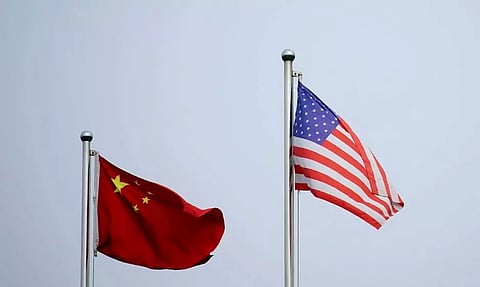

NEW YORK: Many Americans, even once-ardent proponents of globalization, have soured on trade with China. But there is a growing danger that as the United States tries to address its difficulties with China, it will pull back too far, severing economic ties that benefit American families and contribute to global peace and prosperity.
The relationship problems are real, and cannot be minimized. Chinese industrial subsidies, often maintained despite promises to the contrary, stripped millions of jobs from America’s industrial heartland. Chinese companies flagrantly steal American innovations. China’s increasingly confrontational posture toward the United States and its allies — including the economic support it is providing for Russia’s invasion of Ukraine — have underscored the need for the United States to align trade policy more closely with other aspects of America’s national interest. In an example of the prevailing mood in Washington, Representative Mike Gallagher, the Wisconsin Republican who serves as the chairman of the pointedly named “Select Committee on Strategic Competition Between the United States and the Chinese Communist Party,” recently called for broad prohibitions on U.S. investment in China, writing in an essay published in The Washington Post that “we are quite literally funding our own potential destruction.”
A new rule book is needed. Too few leaders, however, appear willing to note that Americans also benefit from trade with China, that the two nations are economically intertwined whether they like it or not, and that it is in America’s interest for the rest of the world to prosper. Americans bought almost $40 billion of Chinese toys, games and sports equipment last year. Soybean farmers in the Upper Midwest sold a record $16.4 billion of their beans to China, mostly for pig feed. Intel takes profits from low-end chips it makes and sells in China to fund the high-end chips it sells in America and to its allies. Hundreds of millions of Chinese have come out of poverty thanks to global trade, and have become consumers of U.S. goods and services. Cummins, an engine maker based in Indiana, operates 21 factories in China, and earns a fifth of its profits from its operations there. “Our success in China has led to global success and U.S. job growth,” Jon Mills, a spokesman for the company, recently told the Times reporter Alexandra Stevenson.
Amid the harsh talk, the dollar value of American trade with China — Americans buying Chinese products and the Chinese buying American products — rose to a record in 2022. The goal of American policymakers ought to be safeguarding the vast majority of those trade flows while addressing the problems that have emerged.
The Biden administration’s top priority in its dealings with China is, as it should be, national security. The president has emphasized the need to limit China’s access to advanced technologies with military applications. An executive order recently signed by Biden that restricts American investment in Chinese firms that work on artificial intelligence, semiconductors and quantum computing is a measured and necessary intervention. The government’s push to provide subsidies for the domestic production of semiconductors is also a sensible policy. The United States needs to secure reliable access to critical materials.
Hawkish politicians from both parties and American companies that stand to gain from protectionist policies, however, are pushing for a broader retreat from trade with China. Donald Trump, whose dim view of trade helped to propel his successful presidential candidacy in 2016, and who is again the front-runner for the Republican presidential nomination in 2024, is promising to “tax China to build up America.” After the Biden administration suspended tariffs on some Chinese solar panels to accelerate America’s conversion to renewable energy, Senate Democrats and Republicans joined in a vote to reimpose the tariffs. “This vote was a simple choice: Do you stand with American manufacturers and American workers, or do you stand with China?” said Senator Sherrod Brown, Democrat of Ohio. Gallagher’s committee, with bipartisan support, has been investigating whether U.S. financial giants like BlackRock and MSCI invested in blacklisted Chinese firms, a warning shot aimed at Wall Street.
The Biden administration describes its approach to trade limitations as “small yard, high fence,” meaning that it is aiming to restrict China’s access to a small number of advanced technologies. But some strictures on trade, notably the broad tariffs on Chinese imports first introduced by Trump and maintained by President Biden, already go too far, imposing costs on American households without much benefit to them or national security.
Keeping the yard from getting bigger is also likely to prove difficult. During Commerce Secretary Gina Raimondo’s recent visit to China, the country’s leading mobile phone manufacturer, Huawei, provocatively released a new smartphone powered by an advanced chip made in China most likely using American technology and machinery. A group of House Republicans sent a letter to the Biden administration citing the phone’s release as evidence of the need for tighter restrictions on China’s access to advanced chips. But China’s ability to make serviceable smartphones does not threaten America’s national security. Restraint is the best policy here. The United States has a legitimate interest in limiting China’s access to military technology, not in preventing the Chinese from checking email.
And while high walls are sometimes essential, so too are broad bridges. It is important to create real penalties for bad behavior by China, but it is also important to reward good behavior. Just as in the United States, there is a debate inside China between trade hard-liners and reformers. America has natural allies among those in China who understand that Beijing has to change and can succeed by playing by the rules.
Some U.S. politicians want to take advantage of China’s dependence to constrain its economic development by denying China the technologies that it needs. The better course is to focus on limiting the reach of China’s military, not its economy as a whole. China sees that it cannot isolate itself from the world; this is not the time for the United States to do so, either.